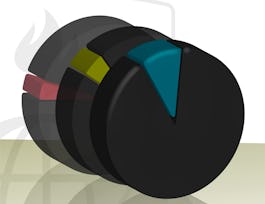This course will introduce the sensory evaluation laboratory and will teach you best practices for testing and documentation. We'll explore how various factors, especially the testing environment, can influence sensory experiments. Our main focus will be on two specific sensory tests: duo-trio discrimination and 3-product consumer testing. Through case studies, we’ll examine how these tests can address product challenges. For both test types, we’ll dive into how to develop an appropriate hypothesis, select products, execute a sensory test, decode collected data, and interpret the test results. Additionally, you’ll learn how to identify and select core and opportunity target groups of consumers. Each module in this course builds towards your final project where you will design a sensory test to conduct your own research experiment.



Sensory Science: Conducting Tests
This course is part of Essentials of Sensory Science Specialization

Instructor: Rebecca Bleibaum
Sponsored by Coursera Learning Team
(14 reviews)
Details to know

Add to your LinkedIn profile
4 assignments
See how employees at top companies are mastering in-demand skills

Build your subject-matter expertise
- Learn new concepts from industry experts
- Gain a foundational understanding of a subject or tool
- Develop job-relevant skills with hands-on projects
- Earn a shareable career certificate


Earn a career certificate
Add this credential to your LinkedIn profile, resume, or CV
Share it on social media and in your performance review

There are 4 modules in this course
Welcome to the last course in the Foundations of Sensory Science series! In this course, we will introduce the sensory evaluation laboratory and teach you how to conduct two types of research experiments: a discrimination test and a 3-product consumer test. In this module, you will learn about errors in testing and ways to minimize those errors to ensure valid and reliable sensory data. You will review principles for recruiting qualified assessors for each test type and discuss ways to instruct assessors and the importance of documenting test instructions. This course will describe best practices testing procedures and ways that a sensory experiment can be influenced, especially the test environment. Let’s get started!
What's included
9 videos2 readings1 assignment2 discussion prompts
In this module, we will begin by discussing discrimination testing methods and what problems they might solve for product issues. You will review various case studies that illustrate common business problems where discrimination testing was beneficial. You will review approaches to establishing a research objective using a balanced reference duo-trio test and the importance of product selection will be discussed. We will identify best practices qualification criteria for sensory analytical tests – discrimination testing and descriptive analysis. This module will teach you the principles of conducting your own research experiment based on discrimination testing principles. We will discuss how to develop an appropriate hypothesis, select products, prepare and conduct testing, decode the data, and interpret the results. In this module you’ll also start developing a sensory test using the tools you’ll gain throughout this course. Let’s begin!
What's included
16 videos1 reading1 assignment1 discussion prompt
In this module, we will continue our discussion by reviewing a different style of sensory testing: consumer product testing. You’ll review consumer product testing methods and how they apply to sensory science. We’ve previously formulated a hypothesis and research objectives. We will now discuss product selection for conducting a consumer test, and review how to identify and select a core and opportunity target group of consumers. We will review the importance of balanced serving orders and discuss how to prepare and conduct a 3-product consumer test. This module will teach you the principles of conducting your own research experiment based on consumer product testing principles. We will discuss how to develop an appropriate hypothesis, select products, prepare and conduct testing, decode the data, and interpret the results. For your final project, you will select and conduct either a duo-trio discrimination test or a 3-product consumer test. You will continue to design the various research components that will be used to build your final project. Both research experiments are designed as paper/pencil activities to aid in the learning process. Let’s get started!
What's included
16 videos1 reading1 assignment1 discussion prompt
In this final module, everything you’ve worked on in the previous modules will come together to complete your project. You will apply the design of your sensory test to conduct a research experiment. You’ll use the testing method, and its principles, you selected in module 3 (either the duo-trio discrimination test or the 3-product consumer test) to conduct your test. You’ll develop the appropriate set of testing materials for the test you selected, as outlined in the program. You will also report on your own research experiment by preparing and reporting your data and key findings. For the final project, you’ll report your findings in the form of a discussion forum and through a graded self-assessment by demonstrating your comprehension of sensory science principles.
What's included
2 videos1 reading1 assignment2 discussion prompts
Instructor

Offered by
Why people choose Coursera for their career




Learner reviews
14 reviews
- 5 stars
85.71%
- 4 stars
14.28%
- 3 stars
0%
- 2 stars
0%
- 1 star
0%
Showing 3 of 14
Reviewed on Dec 1, 2023
Great course! Perhaps could benefit from a clearer restructuring of the specialised and technical language being used for novices who are not well-versed in the subject matter :)
Recommended if you're interested in Health

Emory University

Johns Hopkins University

Kennesaw State University

Johns Hopkins University

Open new doors with Coursera Plus
Unlimited access to 10,000+ world-class courses, hands-on projects, and job-ready certificate programs - all included in your subscription
Advance your career with an online degree
Earn a degree from world-class universities - 100% online
Join over 3,400 global companies that choose Coursera for Business
Upskill your employees to excel in the digital economy


